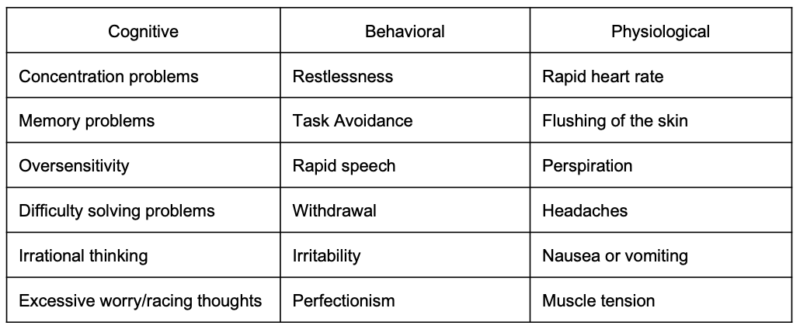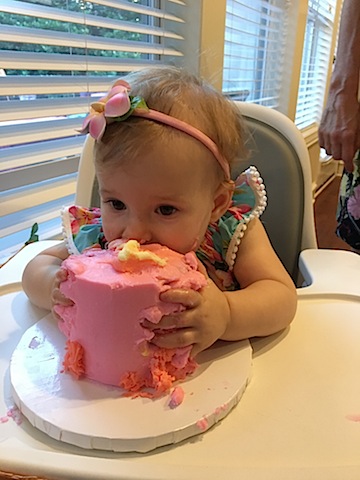I ran across this anxiety presentation my colleague (Dr. Staci Bloom) and I gave a couple of years ago, and thought it might be helpful. It was geared towards school/test anxiety, but most of the information can be applied in other situations. I’ve seen some behavior in Emerson that I later realized was anxiety and have been making sure to give her lots of hugs and reassurance – she’s definitely picking up on some of our conversations/comments/behavior right now and worrying about the changes in her routine.
As I’m sure many of you know, a bit of worry or nervousness is normal about an event that has the potential to be stressful.
Worry becomes anxiety when:
1. Thoughts become excessive, irrational, and constant (cognitive)
2. Worry manifests as physical symptoms (physiological)
3. There’s a behavioral response (behavior – fight or flight)
Our bodies were designed to become anxious in threatening situations (lion, tornado), but if we feel anxiety in response to a non-threatening situation (dance class, test, social event), that’s when it can become a problem. Of course, the current situation is somewhere in between these two examples, so you can see why the whole world is anxious.
Physiological symptoms such as sweating and rapid breathing are caused when the body releases the adrenaline hormone to prepare for danger. Your body’s response causes your thoughts to start racing and leads to cognitive symptoms such as irrational thinking or worse case scenarios. And then you change your behavior as a result:

Typical Childhood Anxiety
- 7-9 months: stranger anxiety
- 12-18 months: separation anxiety
- Until ~age 8: children anxious about identifiable events such as animals, the dark, older kids
- After ~ age 8: anxiety-producing events become more abstract and less specific: grades, peer interactions
- Adolescents: anxiety about moral and religious issues and how adolescents will fit in with peers
Negative cycle of anxiety at school often looks something like this:
Repeated difficulties → lowers self esteem → negative thoughts → anxious thoughts
Worry/fear/extreme thinking skyrockets→ impacts performance → poor performance reinforces fears → more anxiety → avoidance and withdrawal
When parents get involved in the negative cycle, they tend to lecture/hover/nag in an attempt to fix things, which puts more pressure and stress on the child (so guilty of this with potty training).
Strategies for reducing anxiety: Self-talk
Self-Talk: The Little-Engine-That-Could Attitude
Negative self-talk before or during tests (or events) cause students to lose confidence
Replace negative self-talk with positive phrases or relaxation
Silently shout “Stop” to interrupt negative self-talk
Positive self-talk builds confidence and decreases anxiety
i.e. Negative: “No matter how hard I try, I won’t pass the test”
i.e. Positive: “I studied all of what was expected, I will do great.”
Examples of positive self-talk to boost confidence before a test:
I have enough time
Being calm helps me to remember more
I am relaxed, focused, and ready
Biblical memorization
Strategies for reducing anxiety: Relaxation
Deep breathing
Listening to relaxing music before a test
Mindfulness exercises
Being present and not imagining ‘what if’ scenarios
Exercise or yoga for kids
Expressive writing before tests or quiz
Offload worries on paper to have more cognitive resources for the test (or event)
Guided imagery
Visualize a calming scene by covering your eyes and mentally envisioning yourself in a relaxing scene (a beach, bedroom, doing a fun activity)
Prayer
What parents can do to ease anxiety:
Be patient and prepared to listen
Reassure that grades do not define a person
Maintain realistic, attainable goals and expectations
Avoid being overly critical or cynical
Be consistent in how you handle problems/discipline
Accept mistakes as a normal part of growing up
Praise and reinforce effort not performance
Emphasize the positive
Do not treat feelings, questions, or statements about feeling anxious as silly or unimportant
Teach your child the relaxation strategies
Help your child learn study skills, organization skills, and test-taking skills
Help your child eat healthy, sleep, and get enough exercise
Seek outside help if the problem persists
And calm your own anxiety first: calm parents raise calm children – this is huge (and quite hard) right now!!
Resources + References
Books for Children:
Testing Miss Malarkey by Judy Finchler
Wilma Jean the Worry Machine by Julia Cook and Anita DuFalla (Julia has actually been reading some of her books on Facebook live this week)
What to Do When you Worry Too Much: A kid’s guide to overcoming Anxiety by Dawn Huebner
Books for Parents:
Helping Your Anxious Child: A Step-by-Step Guide for Parents by Ronald Rapee and Ann Wignall
Freeing Your Child from Anxiety: Practical Strategies to Overcome Fears, Worries, and Phobias by Tamar Chansky
References
American Academy of Child and Adolescent Psychiatry. (11/12). The Anxious Child. Facts for Families. Washington, DC.
American School Counselor Association. (01/01/04). Helping Children Overcome Test Anxiety. Retrieved from http://www.schoolcounselor.org/magazine/blogs/january-february-2004/helping-children-overcome-test-anxiety.
Anxiety and Depression Association of America. (n.d.). Test Anxiety. Retrieved from http://www.adaa.org/print/living-with-anxiety/children/test-anxiety.
Blow, M. (5/3/11). Conquering Test Anxiety. Retrieved from http://www.scholastic.com/teachers/classroom-solutions/2011/05/state-assessments-reducing-test-anxiety.
Faustino, T. & Kulaga, T. (8/20/12). For parents: Tips for Combating Test Anxiety. Retrieved from http://www.nysut.org/resources/all-listing/2012/august/for-parents-tips-for-combating-test-anxiety.
Huberty, T. J. (n.d.) Anxiety and Anxiety Disorders in Children: Information for Parents. Helping Children at Home and School II: Handouts for Families and Educators. Bethesda, MD: National Association of School Psychologists.
Huberty, T. J. (9/09). Test and Performance Anxiety. Principal Leadership.
KidsHealth. (n.d.) Helping Kids Handle Worry. Retrieved from http://kidshealth.org/parent/positive/talk/worrying.html.
KidsHealth. (n.d.) When Tests Make You Nervous. Retrieved from http://kidshealth.org/kid/feeling/school/test_anxiety.html.
Lehman, J. (n.d.) Freaked Out Part I: Understanding Kids with Anxiety. Retrieved from http://www.empoweringparents.com/article_print.php?id=106
Lehman, J. (n.d.) Freaked Out Part II: How to Help Kids Manage Their Anxiety. Retrieved from http://www.empoweringparents.com/article_print.php?ide=107
Lite, L. Ease Test Taking Anxiety. (n.d.). Retrieved from http://www.stressfreekids.com/resources-2/self-esteem-in-children/test-taking-anxiety
Lowe, P. A., Unruh, S. M., & Greenwood, S. M. (2004). Anxiety: Tips for Teens. Helping Children at Home and School II: Handouts for Families and Educators. Bethesda, MD: National Association of School Psychologists.
New York Association of School Psychologists (08/13). High Stakes Testing & Children’s Well-Being: A Guide for Parents.
Paul, A. M. (2/11/13). Relax, It’s Only a Test. Retrieved from http://content.time.com/time/magazine/article/0,9171,2135124,00.html.
Pincus, D. (n.d.). Parental Anxiety? 5 Ways to Relieve the Worry. Retrieved from http://www.empoweringparents.com/article_print.php?id=421
Strauss, V. (2/10/13). Test anxiety: Why it is increasing and 3 ways to curb it. Retrieved from http://www.washingtonpost.com/blogs/answer-sheet/wp/2013/02/10/test-anxiety-why-it-is-increasing-and-3-ways-to-curb-it/.
Wright, S. & Sulkowski, M. L. (n.d.). Research-Based Practice Assessing and Treating Childhood Anxiety in School Settings. Retrieved from http://www.nasponline.org/publications/cq/41/8/anxiety.aspx




occula
March 25, 2020 at 5:43 pmDid you work at a private school? I hope this presentation at a public school didn’t encourage the kids to combat anxiety through prayer and memorizing parts of one religion’s holy book. That’s really inappropriate.
Laura
March 25, 2020 at 6:04 pmYes, I worked in a religious private school
occula
March 25, 2020 at 6:11 pmwhew, that makes a lot more sense!
Sharon
March 30, 2020 at 5:20 pmThank you for posting this! Lots of very useful advise, that can be sorted through and applied to own individual needs be it age, stage, religion etc. 🌸
Laura
April 2, 2020 at 2:36 pmYou are welcome!